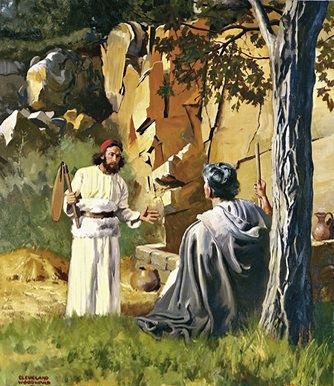This article is part of a series on Old Testament Christophanies. For important background information, see An Introduction to Old Testament Christophanies–with Justin Martyr.

Judges 6 begins during one of the periods when there was no judge. The Israelites did what was evil in the sight of the Lord, so He handed them over to the Midianites. The people cried out to the Lord, so He came down to raise up another judge:
Then the angel of the LORD came and sat under the oak that was in Ophrah, which belonged to Joash the Abiezrite as his son Gideon was beating out wheat in the wine press in order to save it from the Midianites. The angel of the LORD appeared to him and said to him, “The LORD is with you, O valiant warrior” (Judg 6:11–12).
The Angel appeared to Gideon close to an oak tree (or terebinth), much like how Yahweh appeared by some oaks (or terebinths) when He visited Abraham in Genesis 18. Gideon received the same visitor that Abraham had: Yahweh on earth. Though a valiant man, Gideon wasn’t well known, nor did he hold a prominent position. But that was all about to change, for the Lord was with him. In the Targum, the Angel stated, “The Word of the Lord is your help.”[1] In the next verse in the Targum, Gideon refers to the Word of the Lord as “the Shekinah of the Lord,”[2] meaning that the author essentially equated the two. In John 1:14 (a verse on the Incarnation of Jesus), the apostle directly connected the Word with God’s glory. God’s glorious presence is in His Son.
By saying that the Lord was with Gideon, the Angel was—in part—saying that He was with Gideon. Gideon asked Him, “if the LORD is with us, why then has all this happened to us? And where are all His miracles which our fathers told us about saying, ‘Did not the LORD bring us up from Egypt?’ But now the LORD has abandoned us and given us into the hand of Midian” (v. 13). Instead of stating that the Angel answered Gideon, verse 14 states that Yahweh answered Gideon. The Angel was Yahweh, while also speaking for Yahweh. He told Gideon to go and deliver Israel from Midian. Gideon asked how he could deliver Israel since his house was the least in Manasseh and he was the youngest in his family. In verse 16, it is again stated that Yahweh answered Gideon. He said to him, “Surely I will be with you,” and that Gideon would defeat the Midianites as easily as he would defeat one man (vv. 14–16). In the Targum, the Lord told Gideon, “my Word shall be your help.”[3]
Then, Gideon said to the Lord, “If now I have found favor in Your sight, then show me a sign that it is You who speak with me” (v. 17). Not only did Gideon seek confirmation that the visitor’s message was from the Lord, but it also seems that Gideon suspected his visitor was Yahweh in some form. In verses 18–21, the Lord agreed to remain where He was while Gideon went to prepare an offering for Him. Gideon presented the offering under the oak (or terebinth) and then the Angel instructed him to lay the meat from a young goat and the unleavened bread on a rock and to pour out the broth. Once Gideon did so, the Angel touched the meat and the bread with the tip of His staff and then fire flared up from the rock, consuming the offering. At that moment, the Angel vanished.
Gideon witnessed a miracle, and now he knew who his visitor was:
When Gideon saw that he was the angel of the LORD, he said, “Alas, O Lord God! For now I have seen the angel of the LORD face to face.” The LORD said to him, “Peace to you, do not fear; you shall not die” (Judg 6:22–23).
Gideon feared death because he understood that to see the Angel of Yahweh is to see Yahweh. The Lord’s assurance to Gideon that he would not die is based on Gideon seeing Yahweh the Son and not the fully unveiled glory of the Father. Jesus said that whoever has seen Him has seen the Father (John 14:9).
Gideon built an altar there in Ophrah and named it YHWH-Shalom, which means “Yahweh is Peace” (v. 24). The name is similar to YHWH-Yireh (“Yahweh Will Provide”), the name Abraham gave to the top of the mountain where the Angel of the Lord stopped him from sacrificing Isaac (Gen 22:11–14). As was no doubt the case with Abraham, Gideon too was at peace after he was visited by God’s Son, the Prince of Peace (see Isa 9:6).
That night Gideon obeyed the Lord’s command: to pull down the altar of Baal that belonged to his father Joash, to cut down the Asherah next to it, and then to build an altar to the Lord on top of the stronghold there. Joash defended his son from the men of the city, arguing that if Baal was a god, “let him contend for himself.” Then, Joash gave Gideon a new name: Jerubbaal, which means “Let Baal defend himself” (vv. 25–32). Even though it was given to him by his father and not by God, like with Jacob, Gideon received a new name after his encounter with the Lord.
Gideon went on to be used by the Lord to perform great deeds, notably defeating the Midianites with only three hundred men. His life as a mighty judge started with a visit from the Son of God.
[1] Targum Jonathan to Judges 6:12.
[2] Targum Jonathan to Judges 6:13.
[3] Targum Jonathan to Judges 6:16.

Leave a Reply